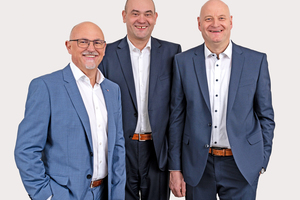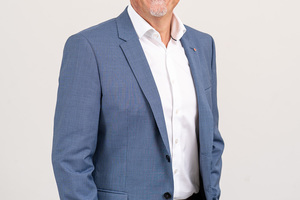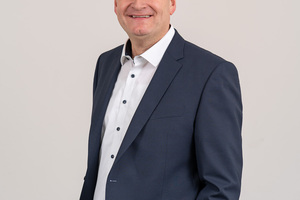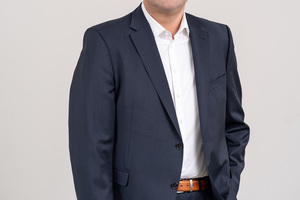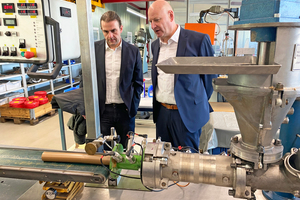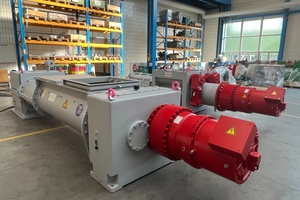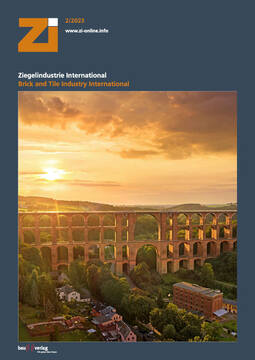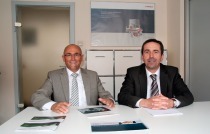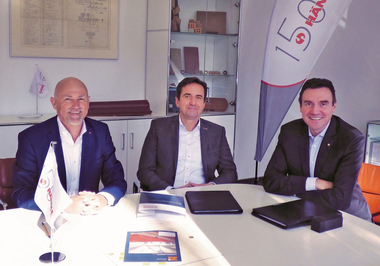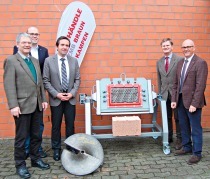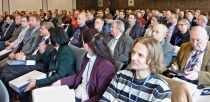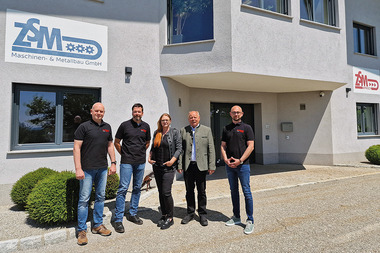“Always one step ahead” - change of management at Händle GmbH Maschinen und Anlagenbau
The traditional company Händle GmbH Maschinen und Anlagenbau in Mühlacker, Baden-Württemberg, enjoys an excellent reputation in the industry. In October 2022, Händle introduced a new drive technology under the name “Green & Energy” with efficiency advantages of up to 20, in some cases up to 50 percent. Currently, the company is facing a change in management. Gerhard Fischer, Managing Director since 2009, will retire as planned at the end of March 2023. He will be succeeded by Thomas Bauer as commercial director, responsible for sales, finance, human resources and IT, and Andreas Treut as technical director, responsible for development/design, purchasing and production. Two good reasons for the ZI editorial team to visit Händle in Mühlacker. After a guided tour of the company, including a visit to the laboratory with a test demonstration, there was an opportunity to talk.
First we talked to Gerhard Fischer about his departure from and his time at Händle.
Gerhard Fischer: When you start working for a company like Händle as a young person after completing your training, you naturally don’t know where your journey will take you professionally in the end. At the time, I knew how to handle state-of-the-art automation technology, and Händle was looking for exactly that kind of knowledge. The company was practically on my doorstep and, unlike in previous jobs, I no longer had to go on assembly there.
GF: From the very beginning, I was fascinated by the customer applications for our machines. We can use them to produce great building materials for healthy living all over the world. We had a clay pit in my hometown and we used to play there as children, the material and the pit itself were fascinating. It is a special passion: “once you touch clay you stick to it”!
GF: Over the years, also due to my part-time studies, I have discovered for myself that it gives me a lot of joy when I can develop organisations and people. Our company has given me plenty of opportunities to do that over the past 40 years.
The first PC at Händle, for example, a Z 80, we still programmed by hand in assembler language. At that time, some suppliers were still working with transmission drives. Today’s state-of-the-art direct drives represent a technical development of ten generations. To be part of this technical change and to develop the company to where we are today, namely as a modern, innovative and internationally active group of companies with a strong shareholder behind us, has fulfilled me.
In addition, the people, the mutual interaction and the structures of a family business have kept me at Händle. Here, in order to do a good job, you have to know and be responsible for not only your own task, but also for the processes before and after it. This togetherness in both social and business matters can be described as Händle’s DNA. It’s a good way to stay with a company for over 40 years.
GF: I am at peace with the decision to leave the operational business. I will not miss the responsibility for the very demanding day-to-day business. Also, the company is at a point where new thoughts and views are good. However, I will continue to be associated with the Steele/Händle group of companies in an advisory capacity and I am very much looking forward to this coming time.
What I will miss are the people. My wife says that my first family is Händle, after that comes the real family. For many years, also as Managing Director, I have always experienced close and trusting cooperation here. I have worked with some colleagues since I started.
It will take some time to adjust to retirement. For the first time, I have not made any plans, almost as a challenge. I want to let go and see what this does to me. Thanks to the many different topics and hobbies that my wife and I have, however, I am very confident that it will work out well.
GF: I have particularly and repeatedly enjoyed the good cooperation with colleagues and customers on challenging projects. When everyone is driven by wanting to do something better and you succeed together, it’s a lot of fun. When I took over as Managing Director in the middle of the global economic crisis in 2008/2009, the conditions were extremely difficult. Everything was collapsing all around, the business was idle. But 2009 and 2010 were some of our best years. With quality, know-how, perseverance and a bit of luck, we won new business fields and customers.
The biggest disappointment for me is related to the development in Russia. In 2010 and 2012, we helped build the two most modern brick plants in the country near St. Petersburg. Seven years ago I would have bet that a large part of our further business development would take place in a democratising Russia. But I was very shaken by what happened last year in February. Less because of the business than because of the terrible suffering that befell the people of Ukraine.
GF: On the customer side, there was and still is a strong trend of market consolidation. On the product level, we have seen a strong qualitative development in surfaces, geometries, colours and shapes in roof tiles and facades. Users’ demands on products in the masonry sector have also increased significantly. Today’s bricks have little to do with the classic brick of the past.
GF: Händle has internationalised in the course of development trends in very different regions all over the world. For example, we were very active in North Africa for ten years. In Algeria, we contributed to the construction of many new brick plants with a total of 250 machines. In Saudi Arabia, we lead the market for equipment in the preparation and shaping sector with a share of 80 percent. Or another example, we have supplied 15 extrusion lines for facade bricks in China within four years.
Changing trends regarding special applications and configurations have also had a strong impact on the company. Händle has the ability to recognise these and react to them flexibly and quickly with customer-specific products and solutions. For example, we decided to return to the roof tile business after many years. Because we can offer the right technical answers for today’s high demands.
A third change is related to two developments on the customer side: Growing demands on automation and drive technology are countered by growing difficulties in finding personnel for production and maintenance. Services are increasingly in demand from us. This business area started with the entry of J. C. Steele & Sons in 2000, and Händle is now primarily a service-driven company. More than two-thirds of our existing business is in the service and after-sales area. We offer systems with life cycles of 40 to 50 years as well as permanent adaptations to customer product changes. This requires, on the one hand, a direct and good connection to the customer and, on the other hand, a service team that can implement this on site. This is both a huge challenge and our strength. This focus on the service business characterises Händle.
Together with the two new managing directors, we talked about the market, the challenges of young talent and digitalisation as well as the new drive system.
GF: The brick industry has some catching up to do in terms of energy consumption and energy sources. Like the entire building industry, it is dependent on fossil energies. As long as there is no green hydrogen, it will remain difficult. The federal and state governments are also called upon here. For the transformation to succeed, however, more political support is also needed at the European level. More good lobbying and joint activities by the entire brick and tile industry are needed.
The German brick industry may be small compared to other building materials, but it has an excellent product. We at Händle are very optimistic that brick building materials will remain in demand, especially for housing, because of its excellent properties as a building material. A good example of this is that high-quality facades made of clay building materials have been experiencing an international renaissance for years. Regardless of whether it is facade panels, clinker bricks, split clinker bricks or facing bricks - those who think in the long term and can afford it will opt for them. This is because such facade technology can function for up to 50 years without reworking. However, many house builders are not yet sufficiently familiar with building materials and the advantages of bricks. Here there is a need to catch up in information work and architect training. The industry, especially the new, young generation, has recognised this and cares. That is why I believe that brick production has a good future in Germany, in Europe and worldwide.
GF: Händle is in a special geographical position with its Mühlacker location. Here we are in competition with the strongly engineering-driven neighbouring regions of Karlsruhe and Stuttgart and companies located there such as Porsche, Daimler and Bosch. And yet, or precisely because of this, we succeed in attracting young and well-trained specialists as a long-term family business and attractive employer.
Andreas Treut: With its 150-year history in the brick and tile industry, Händle stands for consistency and tradition, which does not exclude exciting work topics, challenging problems and state-of-the-art machines, processes and technologies. Skilled workers see and appreciate these opportunities and inspire us and our customers with know-how and fresh ideas. We also place increased emphasis on commercial and technical training as well as on courses of study at Baden-Wuerttemberg Cooperative State University and thus on long-term recruitment from our own junior staff. We are proud that we have already trained more than 1,000 young people; values and consistency are also reflected here. Permanent further development is also a good keyword. For further professionalisation in the individual fields, we are intensifying the opportunities for targeted further training.
GF: Permanent development and involvement with the people who work for us are important for Händle as an attractive employer. This includes lean processes and functioning IT structures in addition to the opportunity to help shape the company. The possibility for flexible working time models such as solutions for working from home or mobile working existed at our company long before Corona.
GF: Yes, but filling and refilling vacancies takes longer and requires more effort The brick and tile industry no longer has the high status it once had, and young talent, from the region and all over Germany, is becoming scarce. That is why we decided last year to bring in qualified people from abroad. We support relocation, naturalisation, language acquisition and integration. This is an investment that pays off. For example, an employee we recruited in this way motivated a friend to come to us who was unhappy at his place of work. International recruiting is playing an increasing role.
It was not difficult for us to implement this approach. In sales, we already speak seven foreign languages because our markets are in these countries. That’s why we are quite “multicultural” at Händle. People from Lebanon, Jordan, Eastern Europe and Portugal, among others, work in sales.
The shortage of skilled workers will become even more acute when the baby boomers leave the labour market in the next few years. Then we will also need concepts for cooperation without having to bring people directly to Mühlacker. For example, we have a fitter who already works 99 percent of the time from his home in France. Five years ago he would have had to work here from Mühlacker. Control in Mühlacker, control assignments around the globe from home - maybe that’s what the future looks like.
GF: The employees in the service area work like independent entrepreneurs. They need good communication with the head of operations and project management and, above all, unconditional support from the head office. We guarantee that and it works very well.
AT: The service staff form a team with high mutual respect, no matter where they are in the world. The existing high level of sense of identity, cohesion and constant communication has developed all by itself.
AT: There is an interplay between the head office, fitters and remote maintenance. The electrical design centre for programming and machine monitoring is located in Mühlacker. We also train our service staff here. Machines can be accessed both from Mühlacker and by our fitters while on the road. There is great potential for the customer to further develop machines in terms of control, automation and digitalisation.
GF: With regard to access to their data networks, customers are often rather concerned that our employees could intervene in processes at the kiln or dryer, for example. We always seek and find amicable solutions, but it is sometimes not easy. Often data access is limited to the time of operation.
AT: This is a challenge for the further development of our machines. To record and optimise the efficiency of a machine, for example an extruder, we need long-term data on operation and wear conditions. This also includes sensitive production data such as throughput per hour. This requires the customer’s trust that no misuse is taking place.
Thomas Bauer: It is not enough to know the speed and torque of the motor. You also need to know what happened before that. That quickly brings us to big data and information about material properties, for example. That quickly touches on company secrets.
GF: Many companies get in their own way when it comes to digitalisation. For us, digitalisation is a huge topic internally. Bringing these processes to the customer often fails because of their structures and lack of participation. For example, we can rarely use maintenance programmes. The customers are not willing to enter the necessary data because it is sensitive.
AT: In such cases, we look for mediating solutions. If we can’t access the network to record and monitor gearbox conditions, for example, we offer completely self-sufficient systems with SIM cards. This way, we receive the transmission data independently of the customer’s network. This is inconvenient, but it allows us to reconcile the divergent needs of us and the customer.
TB: Unfortunately, you can’t really speak of a digitalised brick and tile industry yet. That is a pity. In view of the recruitment of young talent, digital solutions for monitoring and control, but also for know-how management and the use of big data are more than sensible. The use of intelligent machines coupled with data-driven remote monitoring and intelligent on-site support and service will inevitably determine the future of our customers and our company. This is where we are pioneers and this is what distinguishes us from others.
TB: The response has been very good. Around 15 machines have been sold since October, four of which are already in operation. The feedback from the sales department has been very positive. What started as an option last year is increasingly becoming the standard. This is true both inside and outside Germany. But of course the fact that the machines come from Händle and are thus customised and will probably be usable for 50 years also plays a role.
AT: Based on decades of research, Händle can adapt the machines to the specific needs of the customer. We understand wear parts in all dimensions, service life, efficiency, etc. Today, after more than ten years of intensive, systematic in-house laboratory research and operational data collection on the customer side, we have a database of more than 200 wear materials, with all factors and parameters recorded. I claim that no other market competitor has such a comprehensive database. We have also developed our own tools for this purpose. For example, we invented the wear ring to measure the pressure wear that is particularly relevant for extruders. The tests are always carried out in real trials.
We do not believe in service life promises from glossy brochures of the wear parts industry. There is also no such thing as “the wear”; the pressure wear in the extruder, for example, is to be seen completely differently than in a mixer, or screen plates. Unfortunately, there are no current research results in the brick industry, which is why we do this ourselves, together with the customers, in a transparent and realistic way.
For the grate plates in the pan grate, we have run all the materials available on the market through an entire life cycle. In the process, we learned that there is no such thing as the one perfect material. Today we can say precisely which material is optimal for which customer for which type of clay for which perforation.
On this basis, we can offer the customer the right material for their purposes. Whether, for example, the extruder should have the longest possible service life or high energy efficiency, we know the best material solution for the clay used under the desired pressure. For those who want both, we can offer solutions at the optimal cost-benefit ratio.
TB: But materials research does not end there. We are closely observing the approaches in the building materials and brick industry for resource-saving and climate-neutral production. In the laboratory, we are conducting research on new materials that could become relevant for brick production, such as secondary raw materials from recycling processes or geopolymerisation.
AT: First of all, you have to understand the machine as a whole system. This starts with the right design of the size, the operation itself, an adapted geometry of the wear parts and optimal wear protection. The addition of modern and up-to-date drive technology ultimately results in efficiency. The goal is to further reduce energy consumption. On average, extruders on the market currently require 2 kilowatt hours per tonne. We determined that through the many operating data recordings. With our “Green & Energy” brand, we have managed to get below 1.0 kilowatt hours per tonne for the extruder. This was only possible with a holistic view of machine and process. In the medium term, I don’t see an even lower energy consumption in the overall system as feasible.
First, however, I am sure that the current drive technology, in which we have invested three years of development, will become the industry-wide standard. The competition will have to orientate itself on this. That is also what Händle is about, that we always want to be one step ahead.
AT: As with Mr Fischer, it’s the shared history, the people and the ethos of constant development. My 40-year professional life has been shaped by Händle, as I joined the company as an apprentice. At that time, I was attracted by the fact that Händle had one of the best and most modern training workshops in the region. I was then able to gain international experience and, after graduating as a master craftsman, I took over the management of vocational training. The responsibility for 50 trainees and the complete teaching content, such as welding, turning, milling, etc., but also control technology, hydraulics, electronics, challenged me and brought me further. Händle has always supported me in other management positions, including my extra-occupational studies. Growing with new tasks and projects - that’s how it is to this day. Thanks to my career, I understand the entire Händle system in all its contexts.
TB: I have been on board as Managing Director of the subsidiary ZMB Braun since 1 May 2020. At that time, the topic of extrusion had already accompanied me for more than 15 years in my previous jobs. So I was familiar with the technical processes and products. What motivated me at that time was the clear customer and service orientation of the company. The decisive factor, however, was that for me an attractive employer promotes and challenges its employees. Since the first day, I have experienced a constant development of the machines and systems, the colleagues and the company. It is fun and a pleasure to continue to shape this process.
The interview was conducted by Zi editor-in-chief Victor Kapr.

